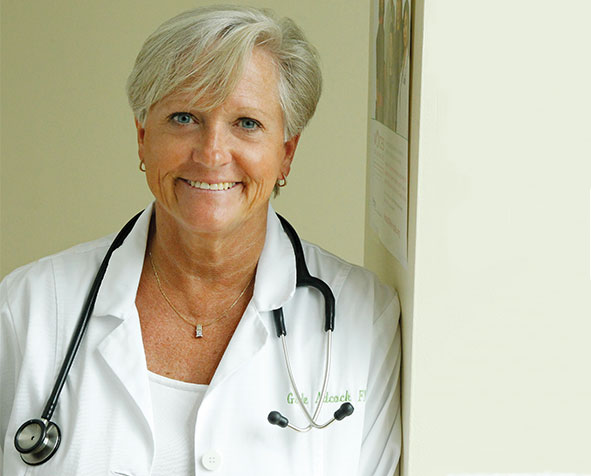Representative Gale Adcock
MSN, RN, FNP-BC, FAANP, FAAN

Career opportunities in the field of nursing are invigorating and satisfy a wide array of interests — it’s one of the many reasons why so many talented individuals are drawn to the profession. Those who haven’t spent much time within the field may believe that while the opportunities seem endless, they still firmly reside within the confines of a hospital or an academic institution. In reality, this perception is quite far from the truth.
The skills that nurses use daily and have cultivated throughout their careers can also be applied to a variety of leadership roles, including that of an elected official or a politician. Gale Adcock has been a Sigma member since 1978 (Beta Nu and Alpha Alpha Chapters) and a member of the North Carolina House of Representatives since 2014.
Adcock advocates for the health of her community through her elected service as a state legislator as well as her role as Chief Health Officer at SAS Institute, Inc. and practicing family nurse practitioner (FNP). Driven by the desire to have a more significant impact on health in the broadest sense, Representative Adcock decided that becoming one of the decision-makers was the best way to have a bigger impact on health by setting health policy. “Healthy individuals and families start with healthy communities. Policy decisions made by elected officials determine how healthy a community can ultimately become, so I decided to become one of those elected officials.”
She began her political journey in 2007, the first of two terms on the Cary, NC Town Council. In 2014 she was elected to the North Carolina legislature, where she remains the only advanced practice registered nurse ever to serve. Currently serving her third term representing the 41st House District, she continues to provide the leadership necessary to allow her constituents, and the communities they call home, to be healthy and thriving. As SAS Chief Health Officer, she leads a 58-member team that provides free primary care to 14,000 employees and family members. “It’s a C-level position that involves financial forecasting, managing an annual budget of $7 million, strategic planning, problem solving, negotiation, consensus building, policy-making, and communicating effectively. It also calls for in-depth knowledge of evolving state and national business practices, as well as the health care environments that exist beyond nursing.”
When asked to describe the skill differences between her roles, Representative Adcock described the core skills needed for her multiple positions as “uncannily similar.” “[Core nursing skills] like the ability to listen without judgement, process large amounts of information quickly, make evidence-based decisions and evaluate results are skills I use every day, as a legislator, an FNP, and the Chief Health Officer,” she said. “Nurses are necessarily courageous and resilient. My business experience adds new depth and range to those characteristics but doesn’t replace them or diminish their worth. Twenty-five years in the corporate world have taught me how to create and defend a business case and hold my ground with other strong-willed leaders competing for limited resources.” She continues, “I’ve also had to develop new skills; like campaigning for and holding office as well as acquiring new knowledge in subjects like environmental protection, public education, transportation infrastructure, taxes, and economic development.”
Nurses have much to contribute to leadership roles in any field and doing so can be one of many ways to continue advancing health across the globe. But, nurses have to get involved in order to do so. As for the best way? “Get involved in your professional nursing organization — and then step outside it. Develop relationships and networks beyond nursing and health care — education, the arts, business, philanthropy, etc. It may seem counterintuitive, but nurses need to intentionally step away from the comfort of what we already know, using our core nursing skills but also embracing the chance to learn new ones. This is how we gain power and influence outside the nursing profession. Ultimately, using these tools is how we advance nursing and individual nurses.”